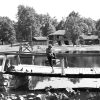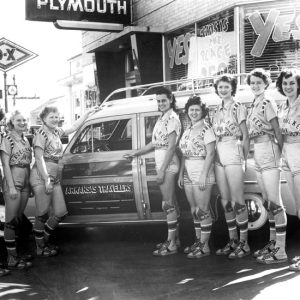calsfoundation@cals.org
Hazel Leona Walker (1914–1990)
aka: Hazel Walker Crutcher
Recognized as the greatest amateur women’s basketball player of the 1930s and 1940s, eleven-time Amateur Athletic Union (AAU) All-American Hazel Leona Walker was the only woman ever to own, manage, and star for her own professional basketball team. For sixteen seasons, from 1949 to 1965, Hazel Walker’s Arkansas Travelers barnstormed the country playing only men’s teams under men’s rules and winning eighty to eighty-five percent of their games.
Hazel Walker was born on August 8, 1914, on her family’s farm near Oak Hill (Little River County), nine miles from Ashdown (Little River County). She was the middle child and only daughter of Herbert S. Walker and Minnie L. Chancey Walker, both Arkansas natives of part Cherokee descent.
Walker first played organized basketball in 1928 as a freshman for the Ashdown High School Pantherettes. By the end of her senior season, she had been named All-Conference three times, All-District twice, and had grown to a muscular 5’9″.
In 1932, Walker and her Pantherettes traveled to Little Rock (Pulaski County) to compete in Arkansas’s first-ever girls’ state high school basketball tournament. Ashdown lost in the finals, but Walker was named All-State and “Most Beautiful Girl in the Tournament.”
Upon graduation, Walker received a partial scholarship to play basketball for the Tulsa Business College Stenographers. In her second season, she led the Stenos to the 1934 AAU national championship and was named to her first All-American team.
After graduating from Tulsa’s two-year program, Walker accepted a bookkeeping job with Lion Oil Company in El Dorado (Union County), where she also starred for the company’s AAU basketball team, the Oilers. At mid-season, on December 16, 1934, Walker married Everett Eugene (Gene) Crutcher of McGehee (Desha County), a railroad brakeman.
Because married women were not allowed to work at Lion Oil, the couple intended to keep their union a secret until after the national tournament. However, when company chairman T. H. Barton found out, he made an exception to keep his star in an Oilers uniform.
Lion Oil ended sponsorship of its team at the conclusion of the 1936 season, and Walker and her husband moved to Little Rock so she could play for the newly formed Lewis & Norwood Flyers. In five seasons, the Walker-led Flyers lost only eight games on their way to winning national championships in 1937, 1940, and 1941.
On August 19, 1940, Walker’s husband was killed in a Santa Fe rail yard switching accident in Pomona, California. In her grief, the twenty-six-year-old widow turned to basketball. But in 1941, when Flyers coach William O. Dunaway was called to the navy upon America’s entry into World War II, the team disbanded.
Walker continued AAU competition as a player/manager for Arkansas Motor Coaches (1942–1944) and concluded as a player/promoter for Little Rock’s Dr. Pepper Girls (1944–1946). During her fourteen seasons as an amateur, the eleven-time All-American’s teams won four national championships, were runners-up four times, and appeared in an additional three final fours. Walker was also a six-time national and two-time international free-throw champion, once hitting a record forty-nine of fifty in competition.
In 1946, Walker turned professional, signing with Olson’s All American Red Heads. The Red Heads toured the nation in a custom station wagon and played mostly men’s teams—civic groups, independents, and teams of community players together for only one game—in the entertaining style now associated with the Harlem Globetrotters.
Walker started a team of her own in 1949 called Hazel Walker’s Arkansas Travelers. The seven-woman squad averaged 220 games a season, three times what the NBA scheduled at the time.
In the best of their sixteen seasons on the road, Walker’s Travelers won 201 games and lost only nineteen. At half time of each game, Walker would challenge all comers to a free throw competition, shooting while standing, kneeling, and sitting. In more than 3,500 challenges, she claimed never to have been defeated.
In 1965, after thirty-seven years in basketball, Walker retired at the age of fifty-one. The next year, she was among the first sixteen women inducted into the Helms Women’s Amateur Basketball Hall of Fame in Los Angeles. In retirement, she cared for her parents until their deaths, gave basketball clinics in schools and colleges, and helped with the Special Olympics. She also enjoyed golf and fishing.
After a series of strokes, Walker died in Ashdown on December 18, 1990, at the age of seventy-six. She is interred at the Ashdown Cemetery.
Walker was named to the Helms Athletic Foundation of Los Angeles Hall of Fame in 1954. On January 15, 1959, she was the only woman among the first five inductees into the Arkansas Sports Hall of Fame. In 2000, CNN/Sports Illustrated named her sixteenth, the highest-ranking woman, on its list of Arkansas’s Top Fifty Athletic Figures of the Twentieth Century. On June 9, 2001, she was inducted into the Women’s Basketball Hall of Fame in Knoxville, Tennessee.
For additional information:
Bailey, Jim. “Walker Dominated Amateur Ranks.” Arkansas Gazette, December 19, 1990, pp. 1D, 4D.
Carey, Robert. “Yesterday: Hazel Walker and the Arkansas Travelers.” Sports Illustrated, November 11, 1974, p. 6E–8E.
Grundy, Pamela, and Susan Shackelford. Shattering the Glass: The Dazzling History of Women’s Basketball Teams from the Turn of the Century to the Present. New York: The New Press, 2005.
Ikard, Robert. Just for Fun: The Story of AAU Women’s Basketball. Fayetteville: University of Arkansas Press, 2005.
Lumpkin, A. “Hazel Walker and the Arkansas Travelers.” Arkansas Journal 29, no. 1. (1994): 32–35.
Williamson, Jim. “Hazel Walker: She Played the Long Shots in Life and Basketball.” Little River News, April 4, 1996, pp. 1, 8, 2B–3B.
Gary Newton
Little Rock, Arkansas
 Recreation and Sports
Recreation and Sports World War II through the Faubus Era, 1941 through 1967
World War II through the Faubus Era, 1941 through 1967 Hazel Walker's Arkansas Travelers
Hazel Walker's Arkansas Travelers 




My mother, Callie Sexton, played in the early 1960s with Hazel Walker and the Arkansas Travelers. She went on to Germany, where she was Europe’s first boys’ basketball coach for the Army. After retuning to the States, she was an interior decorator but mostly ran a drapery workroom, designing, making, and installing window treatments over 30 years. In the 1970s, my mom and dad had a cattle ranch in Mississippi. They patented a grass for cattle feed called “Callie Giant Bermuda Grass.” After I was born she added French antiques importer to the roster, having a successful shop until her death from cancer in 1990. Born in Luxora, Arkansas, she excelled at high school ball and was one of the youngest rookies on the team. We were in Marion/West Memphis in the early 1980s but moved to Memphis in 1984 where I still live. I lost all memorabilia and news clippings, so finding any information or pictures is thrilling.
I’m proud to say my great-aunts, Betty and Pretty Pat Johnson, played for Hazel Walker’s team. It is such an honor and privilege to know they helped make history.
In 1949 or 1950, I saw Miss Hazel and her team play the Madisonville (Texas) High School Mustangs in the Madisonville High School gym. I don’t remember which team won the game, but I do remember Miss Hazel inviting any and all from the crowd at half-time to join her in a free-throw-shooting contest. Only one person acceptedmy friend Jerry White, who also played on the Mustang team contesting Miss Hazel’s team that night. Jerry beat her by one shot, but she was very gracious and was roundly applauded. I explicitly remember Miss Hazel; she was tall, graceful, willowy, marvelously talented, with an olive complexion, just beautiful.
(2017) I remember back in the early 1950s while I was attending MU in Columbia I played against the Arkansas Travelers. Our team was called Simmons Furniture. It was a good game and I recall how tough they were under the boards. But if memory serves, we beat them. Today I’m an 85-year-old sport psychology consultant.
My mother, Peggy Dean Tortorice, was a member of Hazel Walker’s Arkansas Travelers. She is second from the left in the team picture. Peggy Dean graduated from Marked Tree High School in 1948, where she was an all-state member of her championship high school team. She joined Hazel Walker shortly after the team was founded.